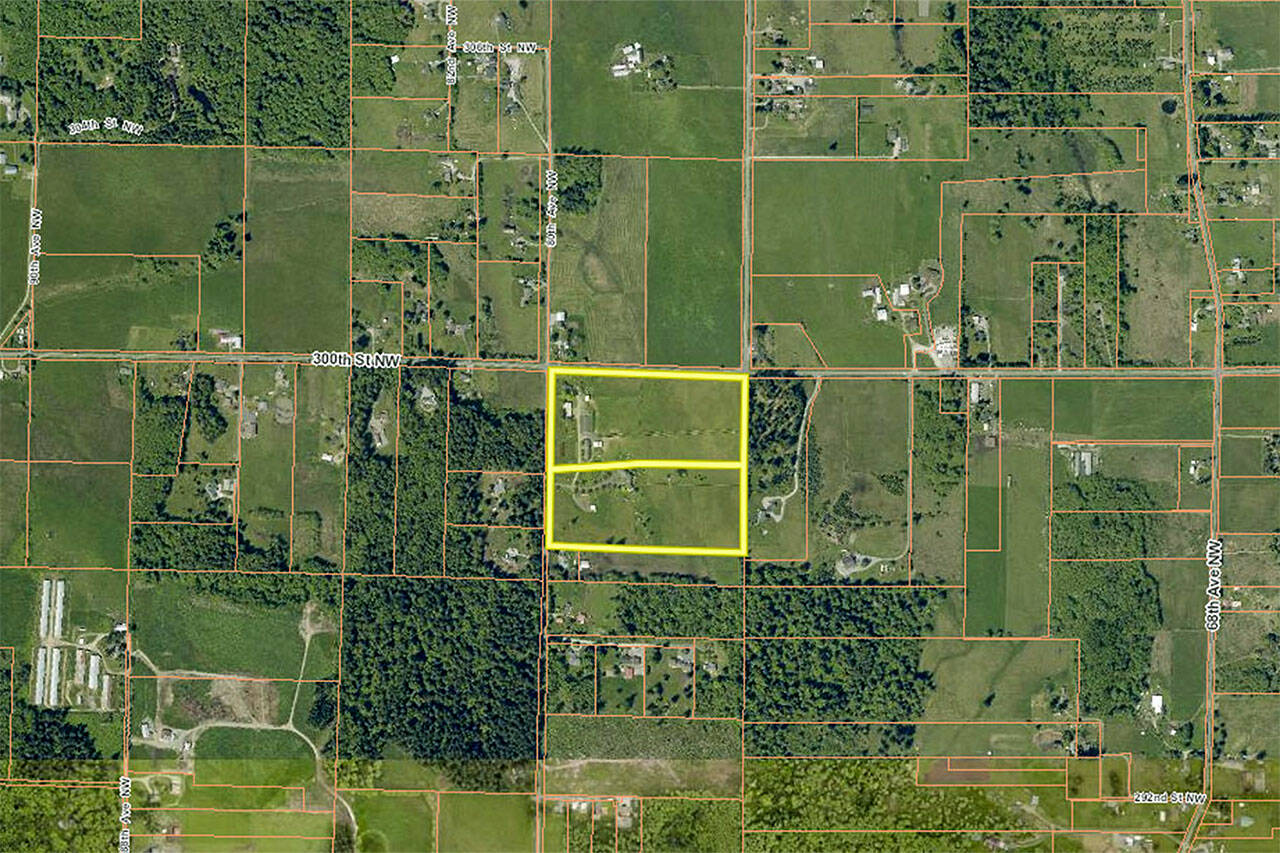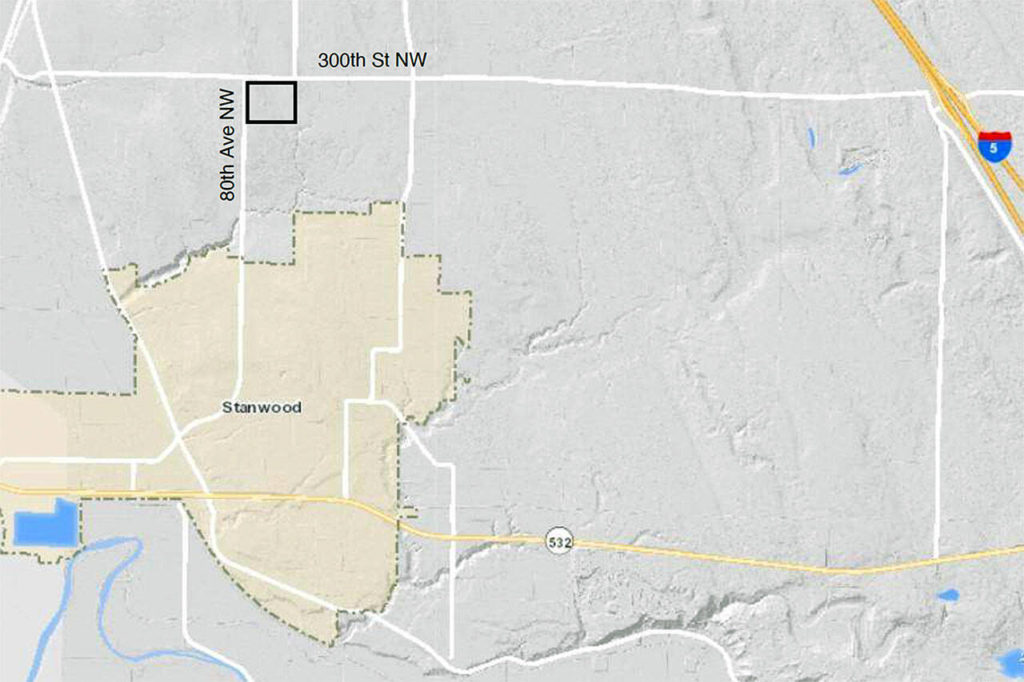STANWOOD — Driving north of Stanwood, one can expect to see a smattering of single-family homes and farmland. Cows graze in pastures. Customers pick up their meat at the local butcher shop.
But near the intersection of 300th Street NW and 80th Avenue NW, locals are seeing signs for a proposed building that some consider out of character for the area: A mental health facility that could bring as many as 32 beds.
If it goes through, the facility will admit adults for long-term involuntary psychiatric treatment. Those beds are much needed in Snohomish County, said Keri Waterland, director of the state Health Care Authority’s behavioral health and recovery division.
She said the center will treat patients with 90- or 180-day orders who are suffering from depression, anxiety or schizophrenia.
It’s part of a five-year plan Gov. Jay Inslee announced in 2018, to shift mental health treatment to smaller community facilities.
“We are transitioning to community-based health services and away from really large institutional settings,” Waterland said.
Two projects have already been announced. A facility south of Olympia is under construction, and another near Vancouver is expected to break ground this summer.
Some neighbors are taking issue with the proposed location in Stanwood.
‘Unanswered questions’
The rural atmosphere is what drew Hank Tingler and his wife to buy their retirement home on 300th Street NW five years ago.
“We were fairly confident we would not have to contend with a building like this going in right next door to us and defiling the views and the tranquility of our neighborhood,” he said.
Others have expressed similar views.
“I’m 100% opposed,” said Steve Snowden, who lives across the street from the project. He argues the facility would lower property values and pose a danger to the neighborhood. He has children ages 11 and 4 and worries about their safety.
Neighbors were caught off-guard when they learned of the project in early February. Those who live within 1,000 feet were mailed notices, and a land-use board was also posted.
“There are a lot of unanswered questions so far,” Snowden said.
The Health Care Authority applied to the county for a conditional-use permit for the facility on Jan. 31, in partnership with the Tulalip Tribes.
As of March 1, the county received 65 comments on the permit, with the majority in opposition and a few in support, said Rebecca Samy, principal planner with county Planning and Development Services. The three-week comment period ended March 2.
Stanwood Mayor Sid Roberts said a residential neighborhood is the wrong place for the facility, especially with the city growing north.
“I’m not against the mentally ill or these facilities — I think they are needed — but we don’t feel like this is the best location for it,” he said.
County Council Member Nate Nehring said many constituents have contacted him.
“The lack of public engagement has been a big concern,” he said.
Nehring was one of three officials who sent a Feb. 28 letter to the Health Care Authority asking the state to work with the Tulalip Tribes to find a different location. Roberts and State Rep. Greg Gilday, R-Camano Island, also signed.
Snohomish County Executive Dave Somers and County Council Chair Megan Dunn declined to comment.
Staff will review the proposal to ensure it complies with county code and make a recommendation to the hearing examiner, who will decide whether to grant the permit, county spokesperson Kent Patton said.
Part of an ambitious plan
Inslee’s plan is to end civil commitments by 2023 at the state’s largest hospitals — Western and Eastern State hospitals near Tacoma and Spokane — to transform the mental health system. Civil commitment is the involuntary hospitalization of a patient.
The idea is to treat patients at smaller facilities and community hospitals, keeping patients closer to “families, friends and support systems,” according to a 2018 Medium post from Inslee’s office.
There has been some progress. In July, a 24-bed psychiatric unit opened at Providence Regional Medical Center in Everett.
The state Department of Social and Health will operate the new Olympia- and Vancouver-area treatment centers. The Stanwood facility will be different.
The new treatment center has roots in a years-long legal fight between the state and the Tulalip Tribes over whether the tribes have a right to the millions of dollars in sales taxes generated by the Quil Ceda Village commercial area.
In January 2020, the two sides reached an agreement: The tribes would get a cut of the sales taxes. In return, they would “invest $35 million in siting, design and construction of a civil commitment facility of 48 beds or less” off the Tulalip Indian Reservation, according to a 2020 memorandum of agreement.
Waterland said the tribes will build the first 16-bed facility. After it is built, the state will procure a provider to operate it, she said. The state will then have an option to build a second 16-bed building in the future.
The Health Care Authority did not give an estimate on the annual operating costs. Spokesperson Amy Blondin said the Legislature will need to appropriate funding.
The tribes deferred to the Health Care Authority to answer a Daily Herald reporter’s questions.
Blondin said the Health Care Authority did not select the Stanwood-area site.
The tribes bought the roughly 30-acre property in November 2011, according to county records. It used to be an Arabian horse farm. The proposed mental health facility does not appear to be connected to the tribes’ Healing Lodge on the same property.
Blondin said Tulalip tribal members will get “limited preference” at the new facility, but there won’t be a special designation for beds.
Waterland said the facility “will serve everyone” in Snohomish County. It will not, however, house criminal defendants with mental health issues, such as those who are not guilty by reason of insanity, she said.
“Primarily it’s individuals who are needing support, rehabilitation services, counseling and medication management … to be stabilized so they can get on with their lives,” she said.
In response to residents’ safety concerns, Waterland said the facility will be “locked and secure,” and that patients cannot just walk out the door.
When patients are discharged, a plan ensures “they have an intentional handoff and can succeed in their community,” Blondin said in an email.
‘Always difficult to find a bed’
The process for civil commitment typically starts when a family member calls a crisis line out of concern for a loved one, Waterland said.
Snohomish County employs 14 designated crisis responders who provide 24/7 services. Cammy Hart-Anderson, division manager for county Behavioral Health and Veteran Services, said those responders will assess whether someone meets the criteria for commitment under the Involuntary Treatment Act.
“We are able to detain someone against their will if an investigation proves they are a danger to themselves, a danger to others or gravely disabled — they’re not able to care for their basic needs,” she said.
Hart-Anderson said many patients initially go to Providence Regional Medical Center in Everett or Swedish Edmonds. Then, the work begins to find a bed.
Patients are also sent to Fairfax hospitals in Everett and Monroe; Smokey Point Behavioral Hospital; and Compass Health in Mukilteo.
“Our crisis responders and hospital staff call inpatient treatment providers across the state,” Hart-Anderson said. “It’s always difficult to find a bed.”
When beds can’t be found, patients get stuck in medical beds or emergency rooms, she said.
Hart-Anderson said a provider can petition a court for a longer-term commitment, if a patient isn’t responding to treatment. Patients can be committed for an additional 14, 90 or 180 days.
“I think any additional beds will help,” she said.
Waterland said the county has just six beds, at Providence, for 90- to 180- day commitment orders. Statewide, there are just 150 beds, according to the Health Care Authority.
‘A big change for our community’
Vicki Russell lives two doors down from the proposed facility near Stanwood.
She and her son distributed fliers about the facility to coffee shops, businesses and the police department in Stanwood. No one knew about the project, she said.
“It just doesn’t feel upfront,” she said.
In public comments and interviews, residents said the facility should be built closer to a hospital and police. They wonder what would happen if a patient or staff member were to get injured, or if a patient escaped.
“We’re in the county and only have two officers in our area, and they have a large area to patrol,” Russell said. “If you call 911, how long does it take to get there?”
The nearest hospitals are about 20 minutes away, in Arlington and Mount Vernon.
Tingler, the neighbor who lives next door, said he looked into the zoning of the state’s civil commitment centers planned near Olympia and Vancouver. One is in a business park, and the other on a Department of Corrections campus, he said.
According to documents submitted with county Planning & Development Services, the proposed Stanwood facility is “consistent with the comprehensive plan” with a conditional-use permit. Residents have their doubts.
Tingler said he has concerns about the water and sewage infrastructure on the site. Traffic is another issue.
About 284 new daily trips are expected at the completed facility, according to permit documents. Seventy employees are expected to work at the two 16-bed facilities.
Elizabeth Reed lives in the Lake Ketchum area, about 2 miles from the site. She serves on the board of a mental health organization and said mental health facilities are important.
She said she is not opposed to the project, but wants residents’ concerns around safety and traffic to be addressed.
“It’s a big change for our community,” she said. “We don’t have anything like this.”
Is someone you know in crisis?
There’s a 24/7 phone number to call: 1-800-584-3578
Share your thoughts
The public will have two more chances to comment on the project: when a SEPA analysis is released and at a public hearing.
The county also accepts comments throughout the review process. To comment or become a party of record, email rebecca.samy@snoco.org.
The state Health Care Authority is set to hold a community meeting about the treatment facility online at 6 p.m. on March 22. To register, visit zoom.us/webinar/register/WN_1yRuN55kR1usoXy6vJNoDA.
Jacqueline Allison: 425-339-3434; jacqueline.allison@heraldnet.com. Twitter: @jacq_allison.
Talk to us
> Give us your news tips.
> Send us a letter to the editor.
> More Herald contact information.


























